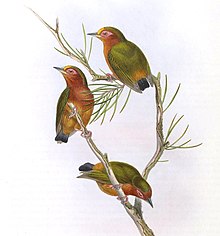Sasia
| Sasia | |
|---|---|

| |
| Sasia abnormis by Gould & Richter | |
| Scientific classification | |
| Domain: | Eukaryota |
| Kingdom: | Animalia |
| Phylum: | Chordata |
| Class: | Aves |
| Order: | Piciformes |
| Family: | Picidae |
| Subfamily: | Picumninae |
| Genus: | Sasia Hodgson, 1837 |
| Type species | |
| Sasia ochracea[1] Hodgson, 1837
| |
| Species | |
|
3, see text | |

| |
| range of genus | |
Sasia is a genus of birds in the woodpecker family Picidae, that are native to the Old World. They are very small, virtually tailless woodpeckers, with a crombec or nuthatch-like appearance and foraging habits. Their habitat is forest and secondary growth.[2]
These species have a flesh orbital ring and a rounded (in cross-section) upper mandible. They have ten rectrices and only three toes (absent first digit, or hallux).[3]
The African piculet has sometimes been included in this genus. It has only eight rectrices and four toes in a zygodactyl arrangement (a weak first digit). It differs from the Asian species in the plumage colour of the adult, but not in the plumage pattern, body anatomy or in habits.[4]
Species
The genus contains two species:[5]
| Image | Common name | Scientific name | Distribution |
|---|---|---|---|
 |
Rufous piculet | Sasia abnormis | mainly Malaysia and Indonesia |
 |
White-browed piculet | Sasia ochracea | mainland Southeast Asia |
Gallery
-
Sasia ochracea
by Gould & Richter -
Close-up of the head
and tail of S. abnormis
References
- ^ "Picidae". aviansystematics.org. The Trust for Avian Systematics. Retrieved 2023-07-26.
- ^ Stevenson, Terry; Fanshawe, John (2001). Field guide to the birds of East Africa: Kenya, Tanzania, Uganda, Rwanda, Burundi. London: T. & A.D. Poyser. pp. 280–281. ISBN 9780856610790.
- ^ Gorman, Gerard (2014). Woodpeckers of the World: The Complete Guide (Helm Photographic Guides). London: Bloomsbury. p. 88. ISBN 978-1408147153.
- ^ Delacour, J. (January 1951). "The significance of the number of toes in some woodpeckers and kingfishers" (PDF). The Auk. 68 (1): 49–51. doi:10.2307/4080797. JSTOR 4080797. Retrieved 20 September 2018.
- ^ Gill, Frank; Donsker, David; Rasmussen, Pamela, eds. (January 2023). "Woodpeckers". IOC World Bird List Version 13.1. International Ornithologists' Union. Retrieved 29 January 2023.


